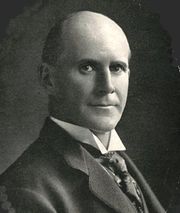| ||||||||||||||||||||||||||||||||
Eugene Victor Debs (November 5, 1855 – October 20, 1926) was an American union leader, one of the founding members of the International Labor Union and the Industrial Workers of the World (IWW), as well as candidate for President of the United States as a member of the Social Democratic Party in 1900, and later as a member of the Socialist Party of America in 1904, 1908, 1912, and 1920. Through his presidential candidacies as well as his work with labor movements, Debs would eventually become one of the best-known socialists in the United States. However, he remained the leader of a marginalized party which - unlike its European counterparts - never managed to gain a mass support or break into a political scene completely dominated by the Democratic and Republican parties. Debs' presidential campaigns were occasions of spreading propaganda and getting public attention for his principled positions, but neither himself nor anyone else considered him to have any chance of actually winning and becoming President, nor did he or anyone else of his party posses a chance to get even a single seat in Congress.
Debs became especially known for his principled, outspoken and uncompromising opposition to American participation in World War I, an opposition which he sustained even at the cost of undergoing a years-long imprisonment. His last Presidential campaign, in 1920, was run from behind bars. Debs' principled position and personal sacrifice won him the respect even of people far from his views, such as President Warren G. Harding who pardoned him in 1921.
Debs declined to run for President in 1924, instead turning the Socialist Party's endorsement to Progressive candidate Robert M. La Follette. Both men died before 1928.
Eugene V. Debs in Southern Victory[]
Eugene V. Debs was a United States Senator from the state of Indiana, the first Socialist ever elected to the Senate. He joined the Socialists shortly after the Second Mexican War. His popularity was such that he was first elected to the Senate in the 1890s, and remained there right until after the Great War. He was a three-time Socialist presidential nominee, running in 1908,[1] 1912, and 1916. In the latter two runs, Debs was handily defeated by Democrat Theodore Roosevelt.
Usually a radical, and an opponent of the US nationalistic ideology of Remembrance, Debs had to seriously compromise his principles and vote to support President Roosevelt's wartime budget when the Great War began in 1914. He was the leader of a mass party, the country's main opposition, with a substantial representation in Congress and realistic aspirations to eventually win power. As such, Debs - whatever his private reservations - could not ignore the widespread support for war among the party's electorate.[2] Thus, when he gave a speech condemning the war in 1915, while his words were eloquent, he was quickly rebuffed by Henry Cabot Lodge for having voted for the war budget in the first place.[3]
In 1916, Debs ran for the presidency on an anti-war platform, and his record for supporting the war budget embarrassed him and other Socialists running in the Congressional elections.[4] However sound the reasons for his shifting position, his image as a principled and uncompromising political leader was irrevocably damaged. Though he gained a substantial number of votes, the Presidency eluded him.[5]
In early stages of the 1920 election, the Socialist convention proved to be deadlocked. Debs, realizing that he stood no chance against Roosevelt, who was running for a third term, but at the same time sensing that Roosevelt was vulnerable, agreed to step aside, allowing Indiana's votes to go to Upton Sinclair, who won the nomination and then the presidency in November.[6]
Despite his firm ideological leanings, Debs was one of those in the U.S. who was alarmed by the early emergence of the Freedom Party in the Confederate States in the 1920s. At Sinclair's inauguration on March 4, 1921, Debs made a point of telling Sinclair that he believed the Freedom Party was "reaction on the march" and could do with some "slapping down". Sinclair was not prepared to respond at the time.[7]
References[]
- ↑ See Inconsistencies (Southern Victory)
- ↑ American Front, pg. 204, pb.
- ↑ Ibid., pg. 205.
- ↑ Walk in Hell, pg. 295.
- ↑ Ibid., pg. 587.
- ↑ Blood and Iron, pg. 318.
- ↑ Ibid., pg. 400.
| Party political offices (OTL) | ||
|---|---|---|
| Preceded by Party created |
Socialist Party of America Presidential candidate 1900, 1904, 1908, 1912 (lost all) |
Succeeded by Allan L. Benson |
| Preceded by Allan L. Benson |
Socialist Party of America Presidential candidate 1920 (lost) |
Succeeded by None; Party endorsed Robert M. La Follette, Sr. (Progressive Party) |
| Party political offices (Southern Victory) | ||
| Preceded by Unknown |
Socialist Party presidential candidate 1908, 1912, 1916 (lost all) |
Succeeded by Upton Sinclair |
| ||||||||||||||











